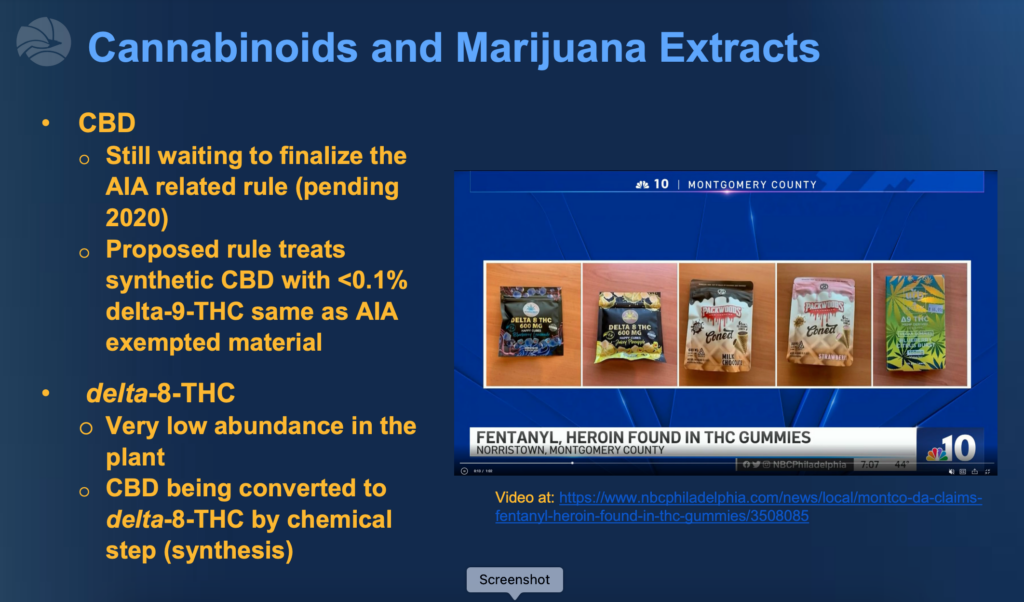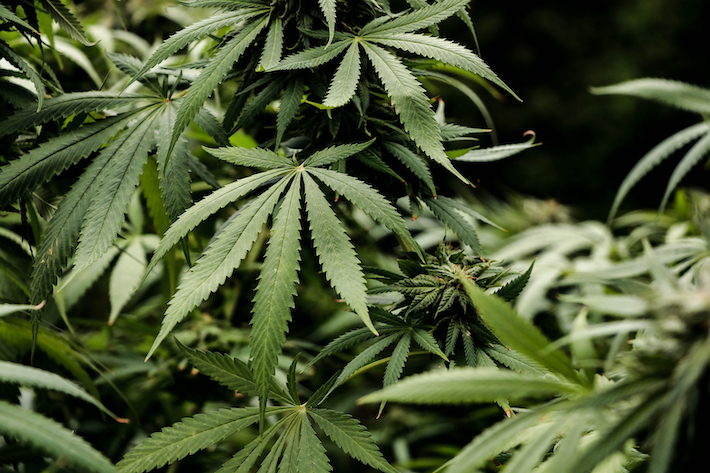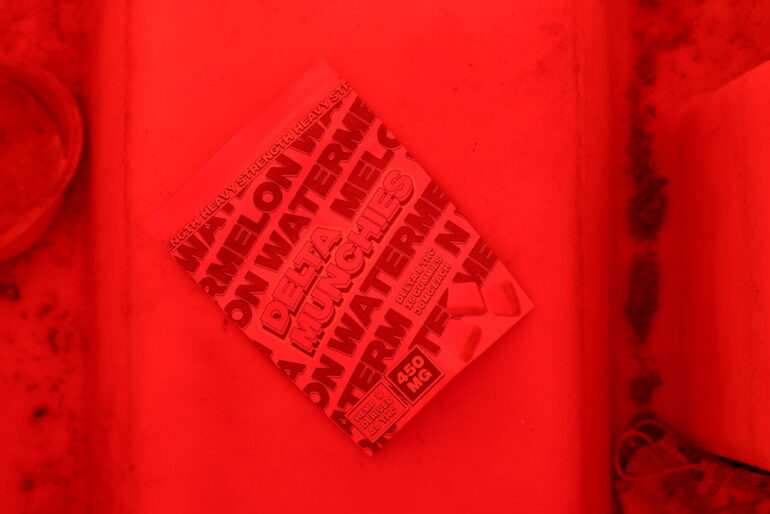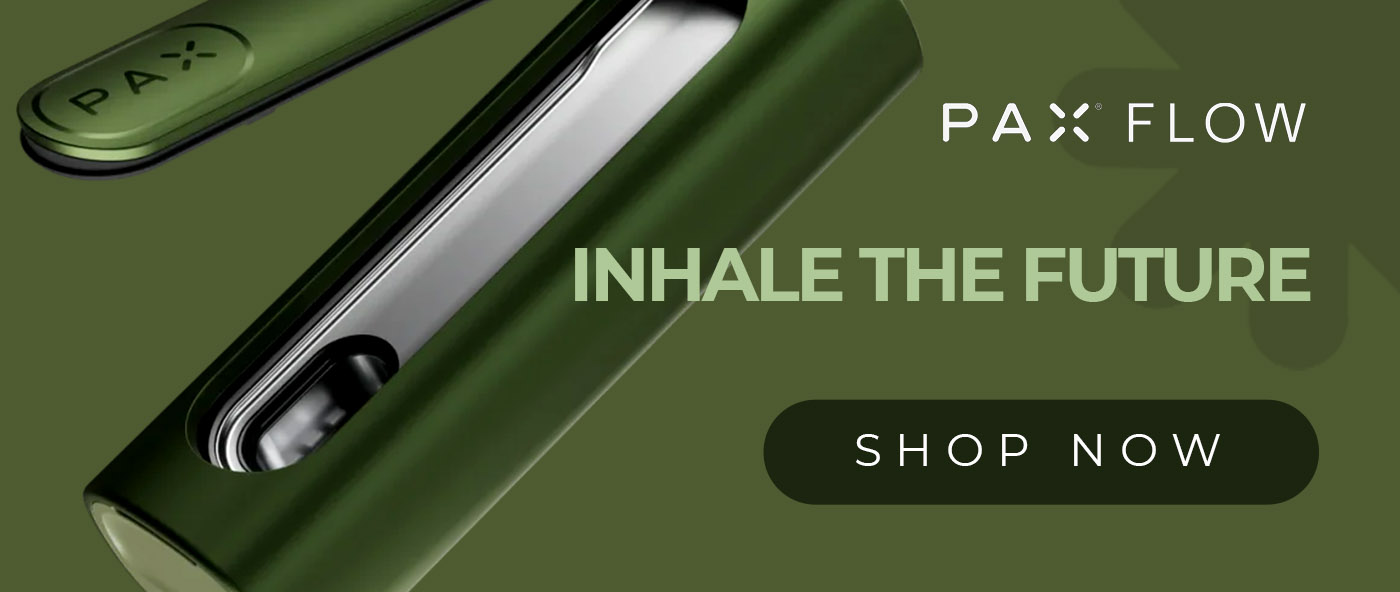Key Points
- DEA Section Chief Terrance Boos said that the new rule will class any cannabinoids created by chemical synthesis from hemp components as “synthetic cannabinoids,” even if they’re identical to natural chemicals.
- This means that delta-8 THC and most hemp delta-9 products will be considered synthetic and outlawed under the CSA.
- The proposed rule will probably be published in the Federal Register in the fall, according to law firm Vicente.
During a presentation at the DEA’s Supply Chain Conference, an agency representative said that a coming rule will re-schedule hemp derived cannabinoids like delta-8 THC.
Terrance Boos, Section Chief at the Drug and Chemical Evaluation Section, said in his presentation, “synthetic tetrahydrocannabinols were not exempted” from the Controlled Substances Act (CSA), and said that under the new rule, “That act of taking that substance in any synthetic step now brings it back under the CSA.”
This would signal the end of the delta-8 THC industry as we know it, and in fact much of the hemp delta-9 industry too. But what does this really mean? Does this mean delta-8 THC is already illegal?
Delta-8 THC Was (Unintentionally) Legalized by the 2018 Farm Bill
The Agriculture Improvement Act of 2018 (commonly called the “Farm Bill”) is generally considered to have legalized delta-8 THC. This is because the law defines “hemp” (page 419) as:
“The plant Cannabis sativa L. and any part of that plant, including the seeds thereof and all derivatives, extracts, cannabinoids, isomers, acids, salts, and salts of isomers, whether growing or not, with a delta-9 tetrahydrocannabinol concentration of not more than 0.3 percent on a dry weight basis.”
This means that “any part” of the cannabis plant, including all cannabinoids, isomers and more, are hemp, as long the delta-9 THC concentration is less than 0.3%. While delta-8 THC is not an abundant component of the plant, it is a naturally-occurring component.

The part of Boos’ presentation on the Farm Bill (slides 25 to 30) explained the issues caused by this, pointing out that even for delta-9 THC, the 0.3% limit means that a 4 g gummy can legally contain 12 mg of THC per gummy. This is only really the start of the issues it creates from a lawmaker’s perspective: they thought they were legalizing “rope, not dope,” but in fact they opened the door to basically any naturally-occurring cannabinoid found in hemp plants.
RELATED: Where Is Delta-8 THC Legal? (State-by-State Map)
Where Does the Delta-8 THC Come From? Is It Synthetic?

There isn’t actually much delta-8 THC in hemp or cannabis naturally. In reality, the delta-8 THC in products for sale is actually made by converting CBD in a process called cyclization.
This opens up the thorny issue of whether delta-8 THC is legally considered a “synthetic cannabinoid.” If it is considered synthetic, then it would be included in the CSA’s definition of tetrahydrocannabinols and therefore would be illegal. So far, many people have assumed that since there isn’t a clear definition of what makes a cannabiniod “synthetic,” and delta-8 does naturally occur in the plant, it wouldn’t meet the definition.
While Boos’ comments on other (related) issues imply that whether a cannabinoid is a natural component of the cannabis plant is an important distinguishing factor, his recent presentation makes it clear that the agency has clarified their position on this.
The DEA Will Take Aim at Delta-8 THC in a New Rule
In his presentation, Boos stated that the agency will be releasing a rule to reschedule some hemp-derived cannabinoids, and made it clear that delta-8 THC would be considered “synthetic” and therefore banned under the new rules.
We spoke to Neil Willner, co-chair of the Cannabis Group at Royer Cooper Cohen Braunfeld, who commented that:
“For the first time, the DEA has publicly addressed – head on – whether hemp-derived CBD that has undergone a chemical conversion to create delta-8 THC is a synthetic tetrahydrocannabinol and therefore a controlled substance.
The presentation quotes federal documents stating that the important factor is whether a product contains “any quantity of a synthetically produced tetrahydrocannabinol,” and points out that “This includes cannabinoid products that are chemically identical to cannabinoids that naturally occur in the cannabis plant but have been manufactured synthetically rather [than] produced by extraction from the plant.”
This strongly suggested that the manufacturing process is crucial to how the end product will be treated, with a key quote from the presentation being “That act of taking that substance in any synthetic step now brings it back under the CSA.” He also added that “a number of states have come up with [regulatory] responses. It’s somewhat of a patchwork right now.”
Neil added a clarification, and drew attention to an important point not realized by many:
“While Boos’s statements are not binding and do not have the force of law, they serve as a good indication of the DEA’s position on the issue at an inflection point ahead of the 2023 Farm Bill in the nascent intoxicating hemp-derived cannabinoid industry. Not only does this impact delta-8 THC, but also the majority of hemp-derived delta-9 THC products on the market since the delta-9 in many of those products had been converted from CBD.”
In short, the presentation strongly suggests that the agency is planning to make a rule based on the “synthetic” process, rather than whether the end component is a natural hemp component. This means that the cyclization reactions are likely to be the crucial factor, and this means that many hemp delta-9 products will be outlawed. Based on our lab analysis, this would be approximately two-thirds of hemp delta-9 products.
What About Synthetic CBD?
The proposed rule also has a plan for synthetically-derived CBD, according to Boos’ presentation. The Farm Bill means that naturally-sourced CBD only has minimal regulation, but for synthetic CBD, the same rules wouldn’t apply. However, the DEA has a simple proposal: as long as there is less than 0.1% delta-9 THC, it will be treated like Farm Bill compliant CBD.
When Will This Come Into Effect? And What Will the Effect Be?
According to cannabis law firm Vicente, it’s unlikely the DEA will publish the proposed rule in the federal register before the fall. The changes it brings, though, will be pretty big.
The obvious consequence is the collapse of the delta-8 industry in much of the country, but as Vicente points out, it will likely generate many conflicts between federal and state law. However, as with the Farm Bill and the flurry of state-level equivalent bills shortly afterwards, it’s likely that the change at the federal level will spur states to take similar local action.
Neil Willner commented to us that, “the statement may also give state law enforcement officials necessary cover to begin ramping up enforcement actions against retailers and manufacturers of hemp-derived THC products that underwent chemical conversion.”
Some ongoing legal action could be impacted, in particular the AK Futures case. Neil points out that the 9th Circuit court had previously affirmed delta-8 THC as legal “hemp” under the Farm Bill, but adds:
“However, that decision was based on a limited record because it was on a motion for a preliminary injunction and there was no evidence in the record about the source of AK Futures’ delta-8 THC. Rather, the only evidence in the record was an FDA document that referred to delta-8 THC as ‘one of over 100 cannabinoids produced naturally by the cannabis plant.’ If defendants introduced evidence that the delta-8 THC was converted from hemp-derived CBD, then it could change the outcome of this action.”
And of course, this is just the tip of the iceberg. The move will undoubtedly send some shockwaves across the industry.
Conclusion: The Loophole Is Slamming Shut
The Farm Bill did essentially legalize delta-8 THC in 2018. But really, this was always something of a loophole, and the presentation shows that it’s one that federal agencies want closed up as soon as possible. The change would mirror that made in states such as New York, where the reactions used to produce delta-8 THC from CBD are the focus of the law rather than the substance itself.
You might ask, “Why should it be legal to painstakingly collect delta-8 from multiple hemp plants but illegal to quickly produce it using chemical reactions?” and in a sense, there is a point there. But the reality is that the lax regulations on hemp are there specifically because it was assumed to be non-intoxicating. If you want your customers to get high, you really should keep the same standards as the regulated marijuana market.

